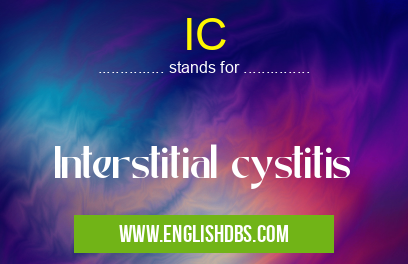What does IC mean in HOSPITALS
Interstitial cystitis (also known as IC or painful bladder syndrome) is a chronic urinary and bladder health condition that causes pain, pressure, and other symptoms in the bladder area. The exact cause of IC is unknown and there is no cure for the condition. However, treatments are available to help manage symptoms and improve overall quality of life for people living with this condition.

IC meaning in Hospitals in Medical
IC mostly used in an acronym Hospitals in Category Medical that means Interstitial cystitis
Shorthand: IC,
Full Form: Interstitial cystitis
For more information of "Interstitial cystitis", see the section below.
Essential Questions and Answers on Interstitial cystitis in "MEDICAL»HOSP"
What is Interstitial Cystitis (IC)?
Interstitial Cystitis (IC) is an inflammatory bladder syndrome which leads to pelvic pain, pressure and discomfort in the bladder area. It can also cause urinary urgency, frequency and nocturia. IC affects both men and women of all ages and can be a chronic condition with severely disruptive symptoms.
What are the main symptoms of IC?
The main symptoms of IC are pain in the bladder area as well as urgency, frequency and sometimes nocturia. Other symptoms may include painful sexual intercourse, lower back pain or abdominal cramps.
How is IC diagnosed?
To diagnose IC, your doctor may refer you for further tests such as a cystoscopy or hydrodistention. These tests look at the wall of the bladder to check for signs of inflammation or ulceration which could suggest interstitial cystitis.
How is IC treated?
Treatment for IC usually involves lifestyle changes such as avoiding acidic foods, limiting caffeine intake and drinking plenty of water. Medications such as antihistamines, tricyclic antidepressants and anticholinergics can help relieve some of the symptoms associated with interstitial cystitis.
What triggers can worsen IC Symptoms?
Common triggers for worsening IC symptoms include stress, spicy foods, certain medications and beverages containing caffeine or alcohol. Additionally, cold winter temperatures may make symptoms worse due to increased spasms in the bladder caused by these temperatures.
Is there any way to prevent flare-ups?
Unfortunately there is no one set way to prevent flares ups however it’s important to keep a “bladder diary” when tracking your urinary frequency patterns so that you know what activities trigger a flare up. Additionally avoiding certain trigger factors such as caffeine will help reduce risk of a flare up.
Can exercise help manage my symptoms?
Yes! Low impact exercises such as walking or swimming have been shown to improve pelvic floor muscle strength which helps manage pelvic pressure associated with interstitial cystitis.Additionally low impact exercising provides relief from stress can help reduce anxiety which has been linked to exacerbating symptom severity.
Final Words:
Interstitial cystitis (IC) is a chronic urinary and bladder health condition that affects millions of people worldwide. Although the exact cause of IC is unknown, researchers have made progress in understanding its underlying mechanisms and developing treatments to help manage its debilitating symptoms. If you’re experiencing any of the common signs or symptoms related to IC, it’s important to speak with your doctor about what options are available so you can live a healthier life.
IC also stands for: |
|
| All stands for IC |
